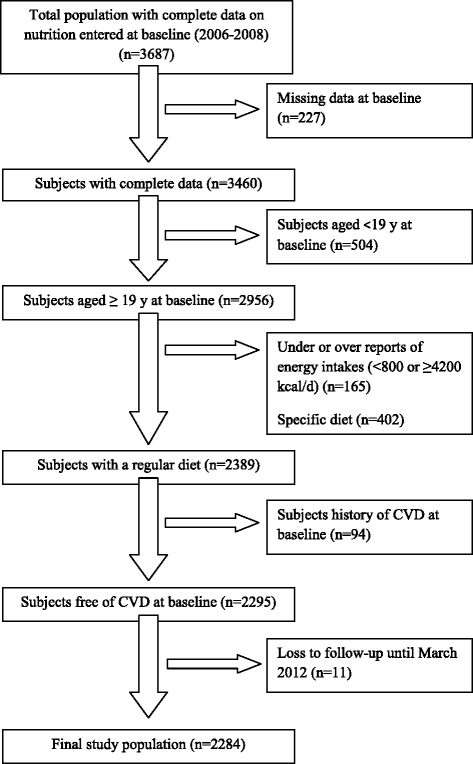Dietary L-arginine intake and the incidence of coronary heart disease: Tehran lipid and glucose study
- PMID: 26985233
- PMCID: PMC4793528
- DOI: 10.1186/s12986-016-0084-z
Dietary L-arginine intake and the incidence of coronary heart disease: Tehran lipid and glucose study
Abstract
Background: We investigated the association of regular dietary intake of L-arginine and both the incidence of coronary heart disease (CHD) and changes of blood pressure.
Methods: Eligible adults (n = 2284) who participated in the Tehran Lipid and Glucose Study were followed for a mean of 4.7 years. Dietary intake of L-arginine was assessed at baseline (2006-2008); biochemical variables were evaluated at baseline and the follow-up examination. Multivariate Cox proportional hazard regression models adjusted for potential confounders were used to estimate the risk of CHD across tertiles of L-arginine intake. Linear regression models were also used to indicate the association of L-arginine intake with changes of serum lipids and blood pressure during the follow-up.
Results: Mean age of participants (42.8 % men) was 38.2 ± 13.4, at baseline. During a mean 4.7 ± 1.4 y of follow-up, 57 participants experienced CHD events. A significant negative association was observed between plant-derived L-arginine intake and changes of both systolic and diastolic blood pressure, whereas animal-derived L-arginine intake was related to increased levels of diastolic blood pressure (P < 0.01). Participants in the 2(nd) tertile (1.45-1.78 g/d) had a significantly increased risk of CHD events compared to the participants in the 1(st) tertile (<1.45 g/d) (HR = 1.90, 95 % CI = 1.03-3.58). The risk of CHD had a decreasing trend across increasing plant-derived L-arginine intake (HR = 1.0, HR = 0.91, 95 % CI = 0.51-1.62, HR = 0.72, 95 % CI = 0.39-1.32, P for trend = 0.03).
Conclusion: Higher intake of plant derived L-arginine may have a protective effect whereas animal-derived L-arginine may be a risk factor for development of hypertension and CHD events.
Keywords: Coronary heart disease; Hypertension; L-arginine.
References
-
- Morris SM., Jr Arginine: beyond protein. Am J Clin Nutr. 2006;83:508S–512S. - PubMed
LinkOut - more resources
Full Text Sources
Other Literature Sources


